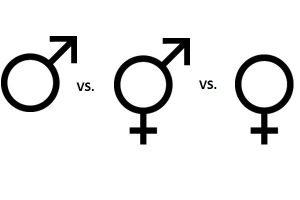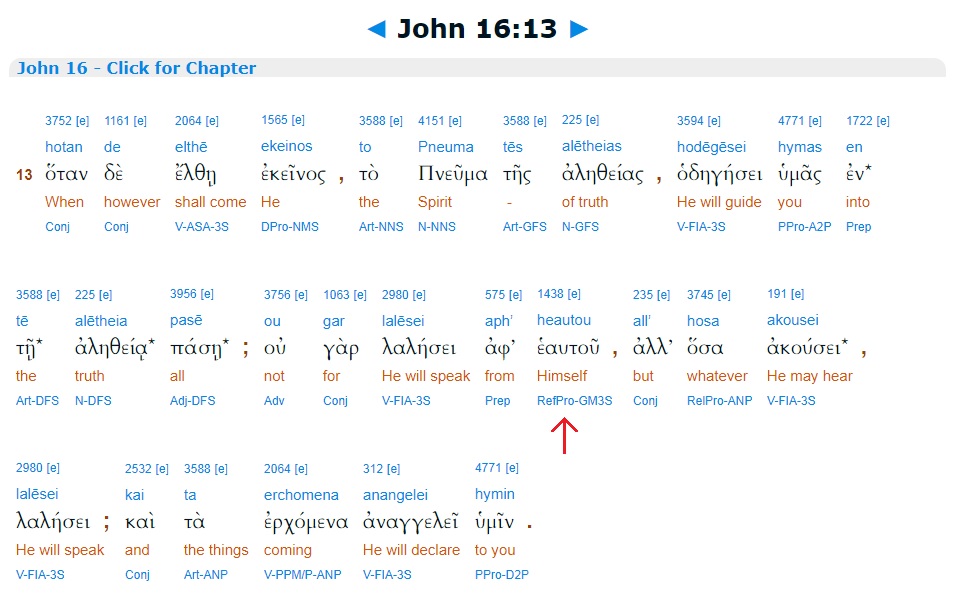 The transgender movement has made a lot of fuss lately about “misgendering” people. That is, not calling someone by their “preferred pronouns”. Setting aside that whole issue for a moment, I thought it would be fun to look at God’s “preferred pronouns”.
The transgender movement has made a lot of fuss lately about “misgendering” people. That is, not calling someone by their “preferred pronouns”. Setting aside that whole issue for a moment, I thought it would be fun to look at God’s “preferred pronouns”.
How does God describe Himself?
Not once in the entire Bible is God referred to as feminine.
Not one single time.
Not even once.
God is always a Father (but never a mother) and Jesus was obviously male. The pronouns used for God are always masculine, never feminine, and even The name of God (Yahweh, or Yehowah) is a masculine word.
Sometimes God uses feminine analogies, but so does Paul and we all agree he wasn’t a woman.
But isn’t the Holy Spirit Feminine in the Old Testament?
Grammatically, yes the Hebrew word for spirit “רוּחַ” (ruach) is a feminine word.
However, there’s a complication from the Hebrew Language itself.
Hebrew is a fully gendered language, meaning every single word in Hebrew is always grammatically either feminine or masculine. Unlike English and Greek, there are no “neuter” words.
For example, in English we have he, she, and it for pronouns (Greek is similar). “He” is obviously male and “she” obviously female, but “it” can be neither male or female. Hebrew doesn’t have any gender neutral words like “it”. (many modern languages are also this way, such as French)
Therefore, in Hebrew everything – even inanimate objects like tables, chairs, or books – are always grammatically either “he” or “she”; but never “it”.
Obviously, books have no gender.
However in Hebrew, grammatically they must have a gender. No Hebrew speaker would think a table, chair, or book was a man or woman, even though the language forces you to say it is.
Further, some words are always feminine or always masculine regardless of any other elements.
For example:
Genesis 1:2
1 In the beginning God created the heavens and the earth.
2 The earth was formless and void, and darkness was over the surface of the deep, and the Spirit (ruach, a feminine word) of God was moving over the surface of the waters.
Yes, it’s a feminine word. However, ruach – the Hebrew word for spirit – is always a feminine word and never a masculine word, even when applied to males. For example:
Genesis 45:27
27 When they told him all the words of Joseph that he had spoken to them, and when he saw the wagons that Joseph had sent to carry him, the spirit (ruach, a feminine word) of their father Jacob revived.
You wouldn’t use this passage to argue that Jacob was a woman would you?
Of course not!
You would look to the subject of the sentence (Jacob) to get the proper gender. That’s because while ruach is technically feminine, it can’t confer gender because it can’t exist as a masculine word.
However, Hebrew proper names can always exist as either masculine or feminine, and thus always determine gender.
God’s proper name “יְהוָֹה” YHWH, typically – and probably incorrectly – pronounced “Yahweh” is a proper name, and therefore can be either masculine or feminine to indicate gender.
God’s proper name (YHWH) is always masculine every time it’s used; it is never feminine (not even once).
Also, Hebrew pronouns can be either masculine or feminine and thus be used to determine gender. Every time a pronoun is used for God, it’s always masculine.
Hebrew is different than English. However, even with the differences there isn’t a single place where God is referred to in the feminine.
Not even once.
But what about the New Testament?
The Greek word for Spirit is “πνεῦμα” (pneuma), which is always grammatically a neuter word (like the Hebrew word is always feminine). It never has a masculine or feminine form and thus can’t be used to determine gender.
Obviously Jesus was a male, and equally obvious is the imagery of “The Father” being masculine. Further, despite not being able to glean anything from the Greek word for spirit (pneuma), there is a place where the “gender” of the Holy Spirit is directly stated by Jesus.
John 16:13 (Please note, Jesus is speaking)
13 But when He (masculine pronoun), the Spirit of truth, comes, He will guide you into all the truth; for He will not speak on His own (masculine reflexive pronoun) initiative, but whatever He hears, He will speak; and He will disclose to you what is to come.
There is some debate as to whether the first pronoun in the sentence can be applied to the Holy Spirit. However, there’s no debate about the second. The second pronoun is the Greek word “ἑαυτοῦ” (heautou) and it means:
1438 heautoú (reflexive pronoun of the 3rd person) – 1438 /heautoú (“himself, herself, itself,” etc.) is the 3rd person reflexive (singular, plural) form which also functions as the reflexive for 1st and 2nd person (A-S).
Now, Greek words change gender depending on the ending of the word. (many languages are like this, including Spanish. For more about Biblical Greek, I recommend my article A few fun things about Biblical (Koine) Greek) So for example, in the following verse it’s in the feminine form:
Matthew 9:21
for she was saying to herself (heautoú in the feminine form), “If I only touch His garment, I will get well.”
However, in John 16:13 where it’s referring to the Holy Spirit it’s in the masculine form = male. You can double check this by looking at John 16:13 in an interlinear Bible. Screenshot below:

The blue letters “RefPro-GM3S” at the bottom indicate the word’s type and form. In this case, it stands for “Reflexive Pronoun – Genitive Masculine 3rd-person Singular“. Again, the referent of this word is clearly the Holy Spirit and it’s a masculine word. Since you can determine a person’s gender in Greek by looking at their pronouns, Jesus was clearly referring to the Holy Spirit in masculine terms.
So that leaves us with one inescapable conclusion:
Never – not even once – is The Father, The Son, or the Holy Spirit referred to as feminine in the entire Bible.
He (God) just isn’t.
Therefore we can be sure that God definitely wants us to see Him as masculine. The entire Bible bears this out by its 100% consistent use of masculine words when describing God.
“But maybe that’s just ‘The Patriarchy’ making God look Masculine“
I mentioned the above to someone one time, and their response was saying that’s because all the writers were men, so they made God male. They argued it was part of the “evil” patriarchy and couldn’t be trusted because there was male bias.
The problem with that statement is it’s self-contradicting.
Either the Bible is a trustworthy source of information about God or it isn’t.
- If the Bible is a trustworthy source of information about God, then we can believe it when it only uses masculine pronouns for God.
- If the Bible isn’t trustworthy source of information about God, then why do we even care what it says?
Seriously.
You can’t have it both ways.
If “The Patriarchy” messed with the Bible, then it’s not trustworthy because it’s been messed with and can be safely ignored. If the Bible hasn’t been “messed with”, then we can take it at its word.
An (unfortunately necessary) addendum: Yes, women absolutely are created in the Image of God.
Some Christians – when the learn that God always identifies as masculine – begin to think only men are created in the image of God. To be clear: yes I believe women were created “Imago Dei” (in the image of God) because the Scriptures are clear on this point. There are only three verses in the whole Bible where “in the image of God” comes up.
We’ll look at each in turn.
Before we look at the first, I need to mention something. In Genesis 1:27, there is a Hebrew definite article (equivalent to our English word “the”) omitted by most translators. You can double check me in an interlinear Bible here.
I have inserted it below.
Genesis 1:26-27
26 Then God said, “Let Us make man in Our image, according to Our likeness; and let them rule over the fish of the sea and over the birds of the sky and over the cattle and over all the earth, and over every creeping thing that creeps on the earth.”
27 God created [the] man in His own image, in the image of God He created him; male and female He created them.
This verse doesn’t explicitly say that women are created in the image of God. However, the phrase “male and female He created them” does directly imply it. Even more clear is when God says “let them rule”. Them, being plural; i.e. Adam and Eve.
However, when read in Hebrew with the definite article (“the“), some Christians say that only Adam was made in the image of God. However, they ignore the word “them” in verse 26 and also the following verse to make that assertion.
Genesis 5 is even more clear.
Genesis 5:1-2
1 This is the book of the generations of Adam. In the day when God created man, He made him in the likeness of God.
2 He created them male and female, and He blessed them and named them Man in the day when they were created.
God named the entire human race “man”. “Man” is the proper/correct name of the human race as decreed by God. Verse 2 clearly says that God named them (plural) man. Man (including both men and women) were created in the image of God according to verse 1.
Therefore women are created in the image of God.
Case closed.
(It’s even more clear if you check the original Hebrew. I’ll omit that now for space’s sake though.)
There’s only one more verse some people use to argue women aren’t created in the image of God. It is:
1 Corinthians 11:7
7 For a man ought not to have his head covered, since he is the image and glory of God; but the woman is the glory of man.
There is a direct contrasting statement being made here. Men are the “image and glory of God” but woman is “the glory of man”. However, Paul doesn’t explicitly say women aren’t made in the image of God. You could argue it’s implied, but not in the face of Genesis 5 (which we just looked at).
Further, a closer look at the creation story makes this fact clear as well. God took a part of man – who is made in the image of God – and formed that rib into woman. Adam later says that the woman is “bone my my bone and flesh of my flesh” (Genesis 2:23). Adam’s bones and flesh were made in the image of God, so wouldn’t woman’s be too, since hers came from his?
So yes, women are definitely made in the image of God (shocker right? 😉 )
But that begs an interesting question:
If both men and women are made in the image of God, why is God always portrayed as masculine?
I’m not God, so I don’t know for sure.
I have many suspicions – some of them strong – but nothing I’m willing to commit to immortality on the internet yet. God chose to reveal Himself as masculine, and I’m willing to accept that He had a very good reason even if I don’t know what it is.
Conclusion
God The Father, God the Son, and God the Holy Spirit are always presented as masculine, 100% of the time with no exceptions. Therefore – whatever His reasons – God has chosen to reveal Himself exclusively as masculine.
I trust He has a good reason for doing so.
That said, both men and women display aspects of God’s character in their natures. (Though that’s another article for another day.)




Sometimes I wonder if the “image of God” would be the male psychological characteristics. For example, the nature of men is more sacrificial than that of women. men are the main providers of the home, they protect society, they gave their lives in wars, most firefighters are men, and these things are sacrifices. In Ephesians 5 Paul only commands man to sacrifice himself as Christ sacrificed himself for the church, he says nothing to the woman.
Paul speaks a sermon to the man, gets there at the end and only tells his wife to respect her husband ‘-‘
Remembering that Christ (man) is the perfect image of God.
Don’t get me wrong, I’m not saying that a woman can’t love a man, but maybe a woman doesn’t love a man the same way he loves her.
I would say that man is closer to the image of God, because his love is based on acts, since female love is based on emotion, female love has to do with how man treats woman. When a man falls in love he feels like protecting his wife, when a woman falls in love she feels protected by him. And that’s not wrong, God wants children to be safe, a woman needs to choose a man who will protect her and her children. Even among the ancient Israelis, the father only gave his daughter to a man who would protect and provide for her and her future children.
Accountability breeds authority, that is why men had leadership, because they took responsibility. Unfortunately, today man has only responsibilities and no authority.
A woman was taken from the rib of a man. A woman completes a man when joined together physically and psychically…Making them one. God is complete…never separated…He is wholly male and female…Perhaps?
My understanding is that the title “El Shaddai” comes from the Hebrew root “shad”, meaning “breast”. “El Shaddai” therefore means (roughly) “the great-(or many) breasted one”, with the implication “the one who suckles (sustains) many”. The problem is that God is not a man, and, if both male and female humans are equal and complimentary images of Himself, then, although we correctly use the pronoun “He”, when referring to “Him”, we take care to not do so in a dogmatic or exclusive way, as if we were referring to a human male, but acknowledge that He contains within Himself all male and female attributes equally represented, merely choosing to be addressed as “He”. A potentially plausible reason for this choice might be the general allocation of governmental (but not spiritual) authority to males. A female pronoun might have undermined this.
To El Shaddai, you may want to check your sources. “El” is the Hebrew word most often translated “God”. Shaddai roughly translates to “almighty”. Like most Hebrew words, it does have other possible translations; but none of them are remotely close to “breast”. (The Hebrew word for “breast” is “דַד” (dad), not very similar.)
To the rest… I’ll refrain from comment for now.
Unfortunately, in today’s world, your research on this topic is needed!
The Greek for holy Spirit or holy ghost is a neuter noun. So that when it is referred to as a he it’s a kind of contradiction and that is I think because the Greek is not as clear with gender as in Hebrew
The reason I think that’s the New testament is not as precise is because one has the holy Spirit to discern such matters and one has to be careful of the human intellect answers versus with what the holy Spirit teaches
Have you looked at WM Paul Youngs thoughts on this topic? It seems you have much in common theologically- except on this point…just food for thought. I loved The Shack, though very controversial. 🙂
I don’t want to misquote him, C.S. Lewis spent quite a bit of time with the idea of gender, masculine and feminine and the idea that God is masculine and His creation is feminine. Thus the Church, composed of men and women, is called the Bride of Christ. I see human fathers as a picture of our loving Father’s relationship with us. The physical unity of marriage is a picture of the level of spiritual intimacy God desires with the Church. And this gives me deep conviction of my failures as a husband and father.
God is a pronoun that transcends all the nonsense arguments regarding gender, sexual preference, identity, etc.
Humans have ascribed the word god to a myriad of icons that span the full range of the interaction with humans, nature and ideology. God is a generic term for a “higher power”, it is something beholden to, something that is believed has control over us that we do not understand but that we can appeal to.
Our translation of the word god has evolved as we have evolved. When we were beholden to nature when the wild activities of nature could kill us with impunity because we could not easily adapt to their vagaries, we defined weather events as gods: wind, rain, sun, drought, floods, frost and so on.
In the first instance, the only hope was to be beholden to these forces and ritually appeal to them to be merciful. As we adapted to such forces, we could mitigate the effects and be better hunters and farmers. Our interactions with nature evolved and we took more command.
We are now at the stage where we understand we cannot fully control nature but we know we contribute to how it behaves. Unfortunately, we believe we have more control over nature than we do.
We also try to interpret nature as a benevolent god when it is not, it is not a god, but that is another argument; 99% of species that have existed on Earth are extinct, and we are not immune to becoming extinct, we are not the god of the Earth; we are beholden to it.
The human species has an incredible advantage over all others, it is not only self-aware and can adapt but is proficient in both. That said, it should not overestimate its abilities.
The human race is better equipped to adapt to climate change than it is to control it. Humans affect the climate but not nearly to the degree they think and they would do well to adapting to survive that try to control the climate.
The climate has been a lot warmer and colder even since the inception of humans and even in recent history. A warmer climate, something humans have experienced, is not necessarily a bad thing, nor is a colder climate.
I remember the doomsday “The Ice Age cometh” rhetoric of 1970s, now I am being told we will get warmer weather in Britain, which I can attest to experiencing colder weather in the UK than we get now.
The climate changes, humans have some effect, other things happen such as volcanoes and meteorite strikes and we’re screwed.
Adapt and survive and stop with all the crazy “NET ZERO” agenda, like it will really matter.
Thank you for this post. I am a 4-year survivor of cancer who had a near death experience back in 2019. I am currently writing a book and is finding the “right” pronoun to refer to God. When my spirit went out of my body and started communing with the powerful presence of God, I understood that my spirit and God’s Spirit are One. We were both formless. The confusion about gender stems from thinking that God has a human form. God is Spirit-formless like the breath (pneuma, ruach). I understood what the Holy Trinity means. 3 personas but One Spirit. As I leave the body, I realize I am not my body, I am the breath – the breath from God that animated my human body as God breathed into my human form, and I am simply returning back to my creator.
We are living in the post-Jesus era, where He has accomplished His mission of forgiving our sins (in advance) and sending us the Advocate (the Friend/Guide/Holy Spirit). The Holy Spirit dwells in all of us. It is just a matter of when we recognize or acknowledge this persona of God that dwells within, with us in our temple (the human body). The Holy Spirit is the same Spirit of Jesus that He was able to send to us because of His death. The main message of God when I was in God’s presence was we are One. We are all One.
I can imagine how confusing it was for the authors and translators of the bible on what pronoun to use. As I am confused now what pronoun to use. Thank you for addressing this topic in your article. I would appreciate more thoughts on this.